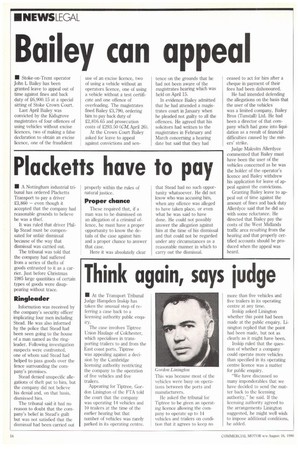Bailey can appeal
Page 16

If you've noticed an error in this article please click here to report it so we can fix it.
• Stoke-on-Trent operator John L Bailey has been granted leave to appeal out of time against fines and back duty of 26,900.15 at a special sitting of Stoke Crown Court.
Last April Bailey was convicted by the Kidsgrove magistrates of four offences of using vehicles without excise Licences, two of making a false declaration to obtain an excise licence, one of the fraudulent use of an excise licence, two of using a vehicle without an operators licence, one of using a vehicle without a test certificate and one offence of overloading. The magistrates fined Bailey £3,790, ordering him to pay back duty of £2,816.65 and prosecution costs of £293.50 (CM, April 26).
At the Crown Court Bailey asked for leave to appeal against convictions and sen tence on the grounds that he had not been aware of the magistrates hearing which was held on April 15.
In evidence Bailey admitted that he had attended a magistrates court in January when he pleaded not guilty to all the offences. He agreed that his solicitors had written to the magistrates in February and March concerning a hearing date but said that they had ceased to act for him after a cheque in payment of their fees had been dishonoured.
He had intended defending the allegations on the basis that the user of the vehicles was a limited company, Bailey Bros (Tunstall) Ltd. He had been a director of that company which had gone into liquidation as a result of financial difficulties caused by the miners' strike.
Judge Malcolm Allerdyce commented that Bailey must have been the user of the vehicles concerned as he was the holder of the operator's licence and Bailey withdrew his application for leave of appeal against the convictions.
Granting Bailey leave to appeal out of time against the amount of fines and back duty Allerdyce said that he did so with some reluctance. He directed that Bailey pay the costs of the West Midlands traffic area resulting from the hearing and that properly certified accounts should be produced when the appeal was heard.




































































